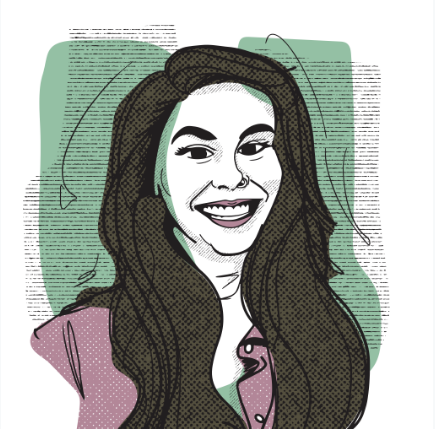After a long time away, I returned to Toronado—one of San Francisco’s craft beer institutions—one recent afternoon, stepping through the Dutch doors to sit at the bar opposite the glowing red halogen “Garage Service” sign. As I gathered my cash, a man beside me lunged toward a woman, aggressively hitting on her. Then a bar towel flew at his head.
Alene Lamb, the sole woman bartender at Toronado, was its propellant. The message: knock it the fuck off. For Alene, it’s just part of the job. “When you're there,” she says, “we might be total assholes to you, but we're also trying to protect you.”
Alene’s worked at Toronado for “at least 12 years and possibly up to 15”—she’s not totally certain—though by the time she started, she was already a veteran of the city’s nightlife industry. She moved to San Francisco in 1991 from San Jose, and found work as a cigarette girl in nightclubs. It paid enough to get by while she took college classes during the day, and it was way more fun than an office.
Work eventually took her to the insular Lower Haight neighborhood, where she started slinging pints to soccer fans at (the recently shuttered) Mad Dog in the Fog. Soon, like other bartenders around Haight and Fillmore, she became a regular at Toronado in her off-hours. Eventually she met all the bartenders, too.
“You didn't go to get some mixology degree somewhere and then walk in and get a job,” she says. “Most definitely you need to be someone that’s generally a heavy drinker and familiar with people that work at the bar already. When it was time to hire somebody, I was the person.”
It was a natural fit. Alene liked the busy event days, like the Barleywine Festival, but she also took to slower mid-shifts, when locals populated the bar. “I [like] happy hours where I see the same people every week,” she says. “They’re like a family to me. I like to hear about how their day went and to [hear] people's secret hopes and wishes.”
San Francisco’s shelter-in-place order, which began March 17, temporarily halted those interactions, forcing bartenders at Toronado and across the city out of work. But for Alene, it was less of an adjustment to her daily life than for her co-workers. Her husband, employed by UC Davis, is still working, and her two kids—aged six and eight—were already homeschooled.
It may be awhile before Alene gets back to work, but she’s not too worried about what Toronado will look like when it reopens. It’s a singular place, vital to the city’s bar scene and integral to the legacy of California beer. But it’s also just a (semi-)friendly neighborhood beer joint. Like any great dive, it’s its own ecosystem, where beer snobs intermix with neighborhood regulars and old-school San Franciscans. There’s a reason its bartenders have a reputation for being spicy; if you’re a jerk, you might get told off—or thwacked by an airborne rag.
“Nowadays when people open a bar, they're not going to be like, ‘Yeah, you can say ‘fuck you’ to the customers,’” she says. “I mean, no one's ever told me that I can, but my voice is heard at the Toronado. We’re a bit more Wild Westy, old-school. We're entitled to our opinion.”
San Francisco Mayor London Breed recently extended the city’s stay-at-home order through May, meaning Alene’s not sure when everyone will get back to work. She does believe, however, that Toronado isn’t going anywhere anytime soon. The city needs it.
“San Francisco is a place [that’s] very stratified: there are extremely wealthy people and there are extremely poor people and then some in the middle, white-knuckled, holding on to the center,” she says. “The Toronado is important because it's a place where a diversity of people visit. You can be super wealthy or flat-broke, and have a beer.”

